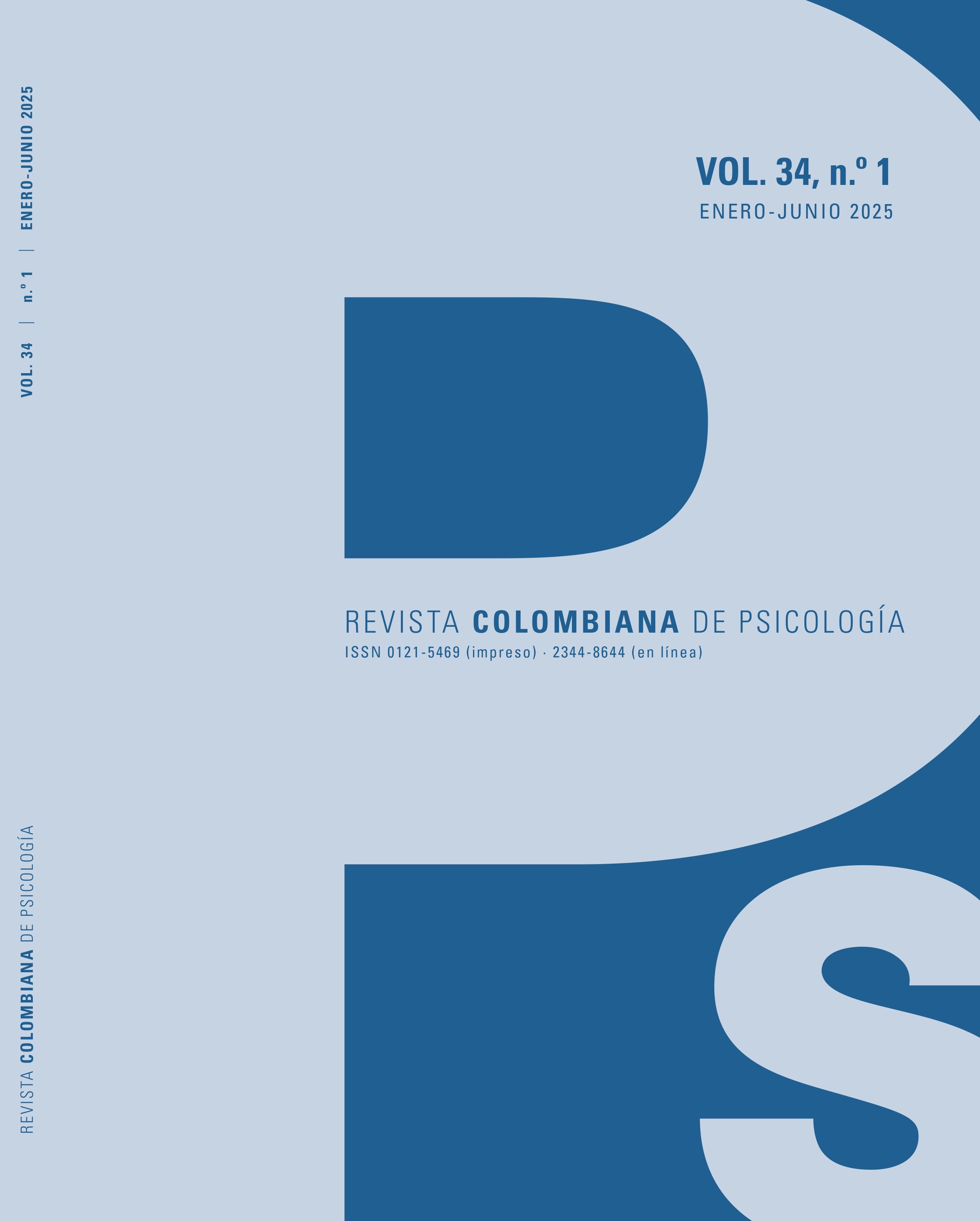Teaching Career in Brazilian Higher Education and Work Engagement
Carrera docente en la enseñanza superior brasileña y compromiso laboral
DOI:
https://doi.org/10.15446/rcp.v34n1.108751Keywords:
work engagement, teaching, higher education, career, positive psychology (en)Downloads
This study examined the relationship between work engagement and teaching career among 220 Brazilian federal public university professors. A sociodemographic questionnaire and the Brazilian version of the Utrecht Work Engagement Scale were used as instruments. The collected data was analyzed using descriptive and inferential statistics. The results indicate that professors in more advanced stages of their careers have higher levels of work engagement, and consequently, feel happier and more fulfilled at work. It is important to consider resources that could contribute to raising levels of work engagement through interventions aimed at people management practices in Higher Education, while also taking into account the health and well-being of professors.
Este estudio investigó la relación entre el work engagement y la carrera docente entre 220 profesores de una universidad federal pública brasileña. Los instrumentos utilizados fueron un cuestionario sociodemográfico y la versión brasileña de la Utrecht Work Engagement Scale. Los datos recolectados fueron analizados utilizando estadísticas descriptivas e inferenciales. Los resultados indican que los profesores en etapas más avanzadas de sus carreras tienen mayores niveles de compromiso laboral y tienden a sentirse más felices y realizados en el trabajo. Es importante considerar los recursos que contribuyen a elevar los niveles de work engagement en intervenciones dirigidas a las prácticas de gestión de personas en la educación superior, que tengan en cuenta la salud y el bienestar de los profesores.
References
Araújo, I. & Esteves, R. (2016). Engagement em docentes do ensino superior: uma abordagem exploratória. Enfermería Universitaria, 13 (2), 73-79. https://doi.org/10.1016/j.reu.2016.03.006
Bakker, A. (2011). An Evidence-Based Model of Work Engagement. Current Directions in Psychological Science, 20, 265-269. https://doi.org/10.1177/0963721411414534
Bakker, A. B., & Bal, P. M. (2010). Weekly work engagement and performance: A study among starting teachers. Journal of Occupational and Organizational Psychology, 83(1), 189-206. https://doi.org/10.1348/096317909x402596
Bakker, A. B., & Demerouti, E. (2017). Job demands-resources theory: Taking stock and looking forward. Journal of Occupational Health Psychology, 22(3), 273–285. https://doi.org/10.1037/ocp0000056
Bakker, A., Schaufeli, W. B., Leiter, M. P. & Taris, T. W. (2008). Work engagement: An emerging concept in occupational health psychology. Work and Stress, 22, 187–200. https://doi.org/10.1080/02678370802393649
Budde, C., & Silva, N. (2020). Impactos na percepção de felicidade no trabalho após um processo de redução nas políticas e nas práticas de gestão de pessoas. Psicología desde el Caribe, 37(1), 40-69. https://doi.org/10.14482/psdc.37.1.305.56
Caldas, C. B., Somensari, P., Costa, S. N., Siqueira, M. M. M., & Claro, J. A. C. S. (2013). Satisfação e engajamento no trabalho: docentes temáticos e auxiliares da EAD de universidade privada brasileira. Gerais: Revista Interinstitucional de Psicologia, 6(2), 225-237. http://pepsic.bvsalud.org/scielo.php?script=sci_arttext&pid=S1983-82202013000200006&lng=pt&tlng=pt
Camões, M. R. S., & Oliveira Gomes, A. (2021). Engajamento no Trabalho: Conceitos, Teorias e Agenda de Pesquisa para o Setor Público. Administração Pública e Gestão Social, 13(3). https://doi.org/10.21118/apgs.v13i3.10572
Cohen, J. (1988). Statistical power analysis for the behavioral sciences. Academic Press.
Dessbesell, V. H., Fabricio, A., Rotili, L., Grzybovski, D., & Carneiro, L. (2017). Engajamento no trabalho em docentes de Instituições de Ensino Superior no Rio Grande do Sul. XXII Jornada de Pesquisa, Ijuí. Anais. https://doi.org/10.6008/cbpc2179-684x.2018.002.0005
Field, L. K., & Buitendach, J. H. (2011). Happiness, work engagement, and organizational commitment of support staff at a tertiary education institution in South Africa. SA Journal of Industrial Psychology, 37(1), 68-77. http://dx.doi.org/10.4102/sajip.v37i1.946
Fletcher, L., C. Bailey, K. Alfes, & A. Madden. (2020). Mind the Context Gap: A Critical Review of Engagement within the Public Sector and an Agenda for Future Research. The International Journal of Human Resource Management. 6–46. https://doi.org/10.1080/09585192.2019.1674358
Geremia, H. C. & Silva, N. (2019). Engajamento no trabalho docente: uma revisão da literatura. In: S. Franco, & E. Escudero. (Org.). El Presente Del Futuro Del Trabajo II: Psicología y organización del trabajo XVI. 1ed. Montevideo - Uruguay: Psicolibros Universitario, v. II, p. 115-133. https://doi.org/10.15581/022.41525
Guglielmi, D., Bruni, I., Simbula, S., Fraccaroli, F., & Depolo, M. (2016). What drives teacher engagement: A study of different age cohorts. European Journal of Psychology of Education, 31(3), 323-340. https://doi.org/10.1007/s10212-015-0263-8
Hakanen, J., Bakker, A., & Schaufeli, W. B. (2006). Burnout and work engagement among teachers. Journal of School Psychology, 43, 495–513. https://doi.org/10.1016/j.jsp.2005.11.001
Hair, J. F., Tatham, R. L., Anderson, R. E., & Black, W. (2005). Análise Multivariada de Dados. Porto Alegre: Bookman.
Haukoos, J. S., & Lewis, R. J. (2005). Advanced statistics: bootstrapping confidence intervals for statistics with “difficult” distributions. Academic emergency medicine, 12(4), 360-365. https://doi.org/10.1197/j.aem.2004.11.018
Huberman, M. (2013). O ciclo de vida profissional dos professores. In: A. Nóvoa (Org.), Vidas de professores. Coleção Ciências da Educação (n. 4, pp. 31-61, 2.ed. Tradução de Maria dos Anjos Caseiro e Manuel Figueiredo Ferreira). Porto, Portugal: Porto Editora.
Isaia, S. M. de A. (2006). Desafios à docência superior: pressupostos a considerar. In: D. Ristoff, & P. Ristoff (Orgs.). Docência na educação superior. Coleção Educação Superior em Debate, 5. 63-84. INEP: Instituto Nacional de Estudos e Pesquisas Educacionais Anísio Teixeira. https://doi.org/10.5753/seadco.2020.14669
Lorente, L. & Vera, M. (2010). Las organizaciones saludables: “El engagement en el trabajo”. Gestión Práctica de Riesgos Laborales, 73, 16-20. https://doi.org/10.7764/rts.78.37-48
Magnan, E. S., Vazquez, A. C. S., Pacico, J. C., & Hutz, C. S. (2016). Normatização da versão Brasileira da Escala Utrecht de Engajamento no Trabalho. Avaliação Psicológica, 15(2), 133-140. https://doi.org/10.15689/ap.2016.1502.01
Marchesi, A. (2008). O bem-estar dos professores: competências, emoções e valores. Porto Alegre: Artmed.
Mercali, G. D., & Costa, S. G. (2019). Antecedentes do engajamento no trabalho dos docentes de ensino superior no Brasil. Revista de Administração Mackenzie, 20(1). https://doi.org/10.1590/1678-6971/eramg190081
Mesurado, B., & Laudadío, J. (2019). Teaching Experience, Psychological Capital and Work Engagement. Their relationship with Burnout on University teachers. Propósitos y Representaciones, 7(3), 12-40. http://dx.doi.org/10.20511/pyr2019.v7n3.327
Paiva, M., Silva, R., Silva, S., & Ferraz, S. (2017). Engajamento no trabalho e clima para serviços em uma instituição federal de ensino superior. Práticas em Gestão Pública Universitária, 1(2), 316-337. https://doi.org/10.5007/1983-4535.2019v12n1p205
Rebolo, F. & Oliveira-Bueno, B. (2014). O bem-estar docente: limites e possibilidades para a felicidade do professor no trabalho. Acta Scientiarum Education, 36(2), 323-331. https://doi.org/10.4025/actascieduc.v36i2.21222
Ribeiro, A. D. S; & Silva. N. (2020). Sentido e significado de felicidade no trabalho para professores. NAVUS: Revista de Gestão e Tecnologia, 10,1-10. https://doi.org/10.22279/navus.2020.v10.p01-10.1266.
Salanova, M., & Schaufeli, W. B. (2009). El engagement en el trabajo: Cuando el trabajo se convierte en pasión. Madrid: Alianza Editorial. https://doi.org/10.5944/rppc.vol.3.num.2.1998.3860
Schaufeli, W.B. (2014). What is engagement? In: Truss, C. et al. (eds), Employee Engagement in Theory and Practice. London: Routledge, pp. 15-35.
Schaufeli, W. B., & Bakker, A. B. (2004). Job demands, job resources and their relationship with burnout and engagement: A multi-sample study. Journal of Organizational Behavior, 25, 293-315. https://doi.org/10.1002/job.248
Schaufeli, W. B., Dijkstra, P., & Vazquez, A. C. (2013). Engajamento no trabalho. São Paulo: Casa do Psicólogo.
Schaufeli, W. B., Salanova, M., González-Romá, V. & Bakker, A. (2002). The measurement of burnout and engagement: A confirmatory factor analytic approach. Journal of Happiness Studies, 3, 71-92. https://doi.org/10.1023/a:1015630930326
Silva Júnior, D. I. da, Ferreira, M. C., & Valentini, F. (2020). Propriedades psicométricas da Escala de Engajamento no trabalho de Professores (EEP). Psicologia: teoria e prática, 22(1), 109-126. https://dx.doi.org/10.5935/1980-6906/psicologia.v22n1p109-126
Silva, N., Tolfo, S. da R., López, A.S., & Cedenõ, A.G. (2015). Psicologia Positiva nas Organizações, no Trabalho e em outros espaços de vida. In: Godoy, L., & Ansoleaga, E. (Compiladoras). Um Campo em Tensíon o Tensíon entre campos: psicologia de lãs organizaciones y del trabajo em Iberoamérica. pp. 389-401. Chile: Ril Editores. https://doi.org/10.36229/978-65-5866-042-2.cap.07
Vazquez, A. C. S., Magnan, E. S., Pacico, J. C., Hutz, C. S., & Schaufeli, W. B. (2015). Adaptation and validation of the Brazilian Version of the Utrecht Work Engagement Scale. Psycho-USF, 20, 207-217. https://doi.org/10.1590/1413-82712015200202
How to Cite
APA
ACM
ACS
ABNT
Chicago
Harvard
IEEE
MLA
Turabian
Vancouver
Download Citation
License

This work is licensed under a Creative Commons Attribution-NonCommercial-NoDerivatives 4.0 International License.
The RCP is published under the Creative Commons license and can be copied and reproduced according to the conditions of this license (http://creativecommons.org/licenses/by-nc-nd/2.5). RCP articles are available online at https://revistas.unal.edu.co/index.php/psicologia/issue/archive. If you would like to subscribe to the RCP as reader, please go to https://revistas.unal.edu.co/index.php/psicologia/information/readers and follow the instructions mentioned in the webpage. Additionally, a limited number of print journals are available upon request. To request print copies, please email revpsico_fchbog@unal.edu.co.


























